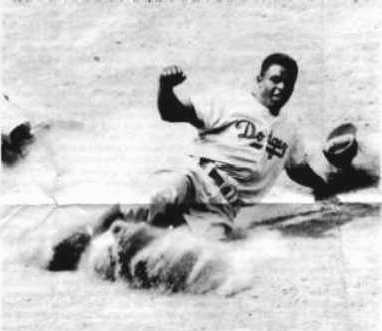|
|

The Courage of Jackie Robinson
Part 3: Later Life and Fame
Other African-Americans followed Robinson in to the Major Leagues. Dan Bankhead pitched for the Dodgers. Outfielder Larry Doby became the American League's first African-American, joining the Cleveland Indians, who also had the legendary pitchter Satchel Paige by the time they got to the World Series in 1948.
 In 1949, Jackie began his third season in the Major Leagues and was given permission to speak out against the continued injustice against him and other African-Americans. This same year, he had a spectacular season on the field. He hit .342 and had 16 home runs and 124 runs-batted-in. His speed on the basepaths was evident as well, as he had 38 doubles, 12 triples, and 37 stolen bases. He was named the National League Most Valuable Player (MVP). In 1949, Jackie began his third season in the Major Leagues and was given permission to speak out against the continued injustice against him and other African-Americans. This same year, he had a spectacular season on the field. He hit .342 and had 16 home runs and 124 runs-batted-in. His speed on the basepaths was evident as well, as he had 38 doubles, 12 triples, and 37 stolen bases. He was named the National League Most Valuable Player (MVP).
Robinson was traded across town to the rival New York Giants in 1956. He retired a month later and left baseball for good.
He went to work outside baseball, as vice president of Chock Full o' Nuts, a coffee and restaurant chain. He was also cofounder of the Freedom National Bank of Harlem. He had other jobs as well. He also worked a good deal with the National Association for the Advancement of Colored People (NAACP).
He continued to be a symbol of advancement in baseball, and he was inducted into the Baseball Hall of Fame in 1962.
As he aged, however, his body weakened. He was struck by diabetes and heart disease and lost his sight. He died of a heart attack on October 24, 1972, in Stamford, Conn. He was 53.
His legacy lives on. In 1972, Rachel Robinson started the Jackie Robinson Development Corporation, which helps build low-to-moderate-income housing. A year later, she started the Jackie Robinson Foundation, which annually provides scholarships to 141 students at colleges and universities nationwide.
Major League Baseball also honors April 15 each year as Jackie Robinson Day, commemorating the day he first played in the Major Leagues.
Most fittingly, his jersey number 42, is no longer available to any player in the Major Leagues. Teams like to retire the numbers of their famous players, as a show of respect. Jackie's number will never be worn by another player for any team.
"A life is not important, except in the impact it has on others' lives."
Graphics courtesy of Library of Congress
|
|

 In 1949, Jackie began his third season in the Major Leagues and was given permission to speak out against the continued injustice against him and other African-Americans. This same year, he had a spectacular season on the field. He hit .342 and had 16 home runs and 124 runs-batted-in. His speed on the basepaths was evident as well, as he had 38 doubles, 12 triples, and 37 stolen bases. He was named the National League Most Valuable Player (MVP).
In 1949, Jackie began his third season in the Major Leagues and was given permission to speak out against the continued injustice against him and other African-Americans. This same year, he had a spectacular season on the field. He hit .342 and had 16 home runs and 124 runs-batted-in. His speed on the basepaths was evident as well, as he had 38 doubles, 12 triples, and 37 stolen bases. He was named the National League Most Valuable Player (MVP).

